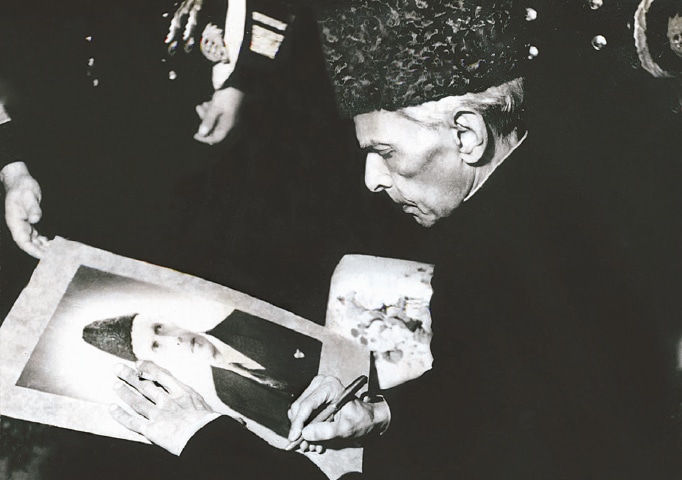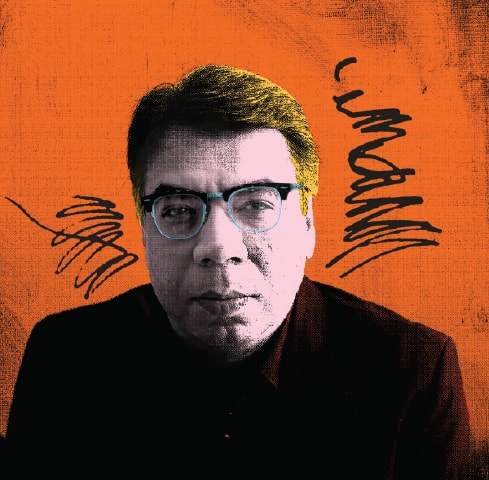
History, like still water, runs deep. When one dives into it one is likely to realise that there is nothing placid about it. There is no foreseeable bottom and, the deeper one goes, the more likely you are to encounter strange creatures that you had no idea even existed.
Many such creatures can be fascinating to some, making them feel wiser about what lies beneath the still surface of history. But some may be apprehensive to dive deeper so as not to disturb the serene stillness of the surface of history that they are most comfortable with.
Take, for instance, the decades-long and unending debate in Pakistan on what kind of country its founder Muhammad Ali Jinnah wanted. On the one hand, you have the religious and centre-right parties insisting that Jinnah had conceived Pakistan as an ‘Islamic Republic’, and it was only natural that such a republic should evolve into becoming an ‘Islamic state.’
Would the Objectives Resolution of 1949 have materialised had Jinnah not passed away so soon after the creation of Pakistan?
On the other hand are the ‘moderate’ and ‘liberal’ intelligentsia who counter this argument by suggesting that Jinnah had imagined Pakistan as a country where a former minority in India would become a majority. But according to them, Jinnah wanted the new majority to be driven by a modern, progressive and democratic interpretation of their faith that would eschew the notion of theocracy because non-Muslims in the new country were to be treated as equal citizens.
Both sides dive into history only to stop and fish out material that they believe would best serve their version of what Jinnah wanted. They wave speeches and quotes of the man in an unending display of one-upmanship. And yet, if one allows oneself to dive even deeper, one is often faced with some puzzling quotes by him.
Such as this one from a speech Jinnah made on April 23, 1943: “I think you will bear me out that when we passed the 1940 Lahore Resolution we had not used the word ‘Pakistan.’ Who gave us this word? The Hindus fathered this word on us …’

What was Mr Jinnah talking about? Dive deeper and you will be able to conclude that Jinnah was explaining the Muslims’ insistence for a separate homeland as a reaction to the idea of an exclusive Hindu domain first aired by Hindu nationalists in the late 19th century and/or almost 60 years before the Lahore Resolution!
This is how: The late 19th century Hindu nationalist, Nabagopal Mitra, and early 20th century men such as Bhai Paramanand, Lal Rajpat Rai, MS Golwalker and V. Savarkar, all described the Hindus of India as a “national race” which would perish if the non-Hindu inhabitants of the region are not “purified” (i.e. converted to Hinduism). They also explained the Hindus and Muslims of India as two separate races. All this was being propagated through books and op-ed articles years before Jinnah and his men finally demanded a separate Muslim country.
In his 1943 speech, Jinnah was simply pointing out the fact that it was the Hindu nationalists who were hell-bent on pushing the Muslims of India to form their own enclave. This, thus, puts to rest the idea that Jinnah’s politics were ‘communal’. The communal notions had first emanated from the other side.
Interestingly, it was an anti-Jinnah Indian historian Dr Shamsul Islam, who exhibited how Jinnah’s politics began being shaped as a reaction to anti-Muslim politics first aired by Hindu nationalists. Dr Islam has reproduced speeches, articles and pamphlets of Hindu nationalists (in this context) in his book Revisiting the Legacy of Allah Bakhsh.
So does this mean that, as a reaction, Jinnah was advocating an “Islamic Republic”? Not quite. For this, one should dive deeper to investigate how certain well-respected Islamic scholars such as the prolific Abul Ala Maududi described Jinnah and his Pakistan Movement.

It’s a well-known fact that a number of clerics and Islamic scholars associated with outfits such as Jamiat-i-Ulema Islam-Hind and Majlis-i-Ahrar and those within the Indian National Congress had staunchly opposed Jinnah. But most interesting is how Maududi Sahib saw him because he (Maududi) became a Pakistani.
Professor Ali Usman Qasmi in his essay on Maududi in “Muslims against the Muslim League” quotes an article that Maududi wrote in the December 1939 issue of Tafhim-ul-Quran. In it Maududi writes: “the whole world knows that he [Jinnah] does not even know the basics of Islam…”
In the February 1946 issue of the same journal, Maududi wrote that the ulema joining Jinnah’s Muslim League will suffer the same fate as the ulema in Turkey did at the hands of the secular Turkish nationalist Kamal Ataturk. Maududi wrote that this was because the fate of the Pakistan Movement “lay in the hands of those who believed in a secular mode of politics and state.”
So, after Pakistan’s creation, when most pro-Maududi elements began to suggest that Jinnah wanted an “Islamic State,” were they also suggesting that a giant scholar such as Maududi was wrong in his assessment of Jinnah and the Muslim League? Poet, playwright and journalist, Safdar Mir, asked the same question in one of his pieces in the January-February 1968 issue of the progressive Urdu bi-monthly Nusrat.
Without really answering this, admirers and followers of Maududi of ten point out that he accepted the idea of Pakistan and migrated to the new country.
But Professor Qasmi in his essay writes that though Maududi migrated to Pakistan, he continued to be critical of Jinnah.
For example, he criticised Jinnah’s August 11, 1947 speech to the Constituent Assembly in which Jinnah explained that the new country would be pluralistic and where the state will have nothing to do with a citizen’s faith. Alluding to the speech, Maududi wrote (in Tafhim-ul-Quran) that the founders of Pakistan were confused and contradictory, talking about Islam through a secular lens and having Western lifestyles. A long feature on Maududi in the September 1949 issue of Tafhim-ul-Quran claimed that when Maududi was put under house arrest, the founder and leaders of Pakistan had “planned to form a secular state”. The same feature alludes that it was Maududi who stopped that from happening.
Maududi only fully entered the country’s politics after Jinnah’s demise and after the passage of the March 1949 Objectives Resolution which resolved to evolve Pakistan as an Islamic Republic. Critics of the Resolution see the document as a ‘political stunt’ by Prime Minister Liaquat Ali Khan to appease the religious parties, while others have called it a betrayal of Jinnah’s vision of a pluralistic Muslim-majority country. They claim that it would never have been authored had Jinnah not passed away so soon after the creation of Pakistan. The historical evidence displayed in this piece tends to point towards a similar deduction.
Published in Dawn, EOS, December 24th, 2017














































